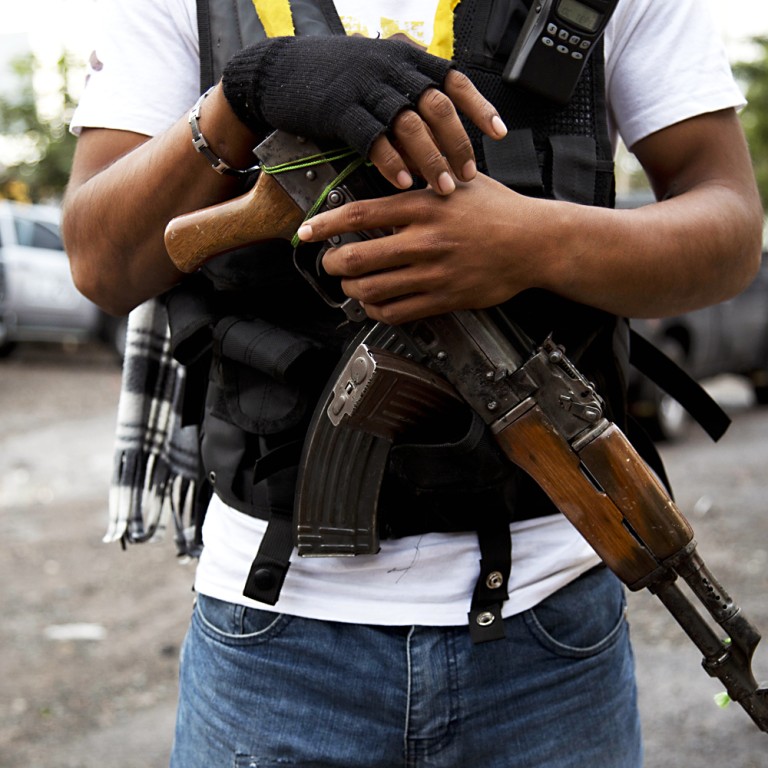
New | Knights Templar drug kingpin arrested as Mexico 'legalises' anti-cartel vigilante forces
Mexico essentially legalised the country’s growing “self-defence” groups on Monday, while also announcing that security forces had captured one of the four top leaders of the Knights Templar drug cartel, which the vigilante groups have been fighting for the last year.
The vigilantes have previously demanded the arrest of the cartel’s major leaders before they lay down their guns.
But on Tuesday, the government said it had reached an agreement with vigilante leaders to incorporate the armed civilian groups into old and largely forgotten quasi-military units called the Rural Defence Corps.
Vigilante groups estimate their numbers at 20,000 armed men.
“The self-defence forces will become institutionalised, when they are integrated into the Rural Defence Corps,” the Interior Department said in a statement.
The twin announcements may help the administration of President Enrique Pena Nieto find a way out of an embarrassing situation in the western state of Michoacan, where vigilantes began rising up last February against the Knights Templar reign of terror and extortion after police and troops failed to stop the abuses.

The Attorney General’s Office has described Loya Plancarte as “one of the main leaders” of the group, saying he was “responsible for press and public relations for the organisation, and it is presumed, the one who had contact with law enforcement and judicial authorities”.
He was found in a home in the Michoacan capital of Morelia, hiding in a closet, accompanired by a 16-year-old boy, authorities said.
National Public Safety System secretary Monte Rubido said the feared drug lord was arrested without a shot being fired.
The 58-year-old Loya Plancarte had a 30-million-peso (HK$17,300) reward on his head from the Mexican government for drug trafficking, organised crime and money-laundering charges. He was considered one of the country’s three dozen most-wanted drug lords in the late 2000s.
The Knights Templar ruled many parts of Michoacan with an iron fist, demanding extortion payments from businesses, farmers and workers, but the self-defence groups have gained ground against the cartel in recent months. Federal police and army troops were dispatched to bring peace to the troubled region.
Ramon Contreras, an activist in the vigilante movement from the town of La Ruana, which was the first to rise up against the Knights Templar, said the arrest “means a lot” to the vigilantes, but added that they would not rest until they see all the top bosses arrested.
Contreras voiced a common belief that the man who founded the cartel – under the name La Familia Michoacana, Nazario Moreno, alias “El Chayo” – is still alive, despite the government’s statement in 2010 that he had been killed in a shootout with federal forces.
“He’s still alive; there’s proof he’s still alive,” Contreras said.
Loya Plancarte joined Plancarte Solis and Servando Gomez in forming the Knights Templar after the purported death of Nazario Moreno.
A local journalist from Michoacan recounted watching when Loya Plancarte lead a sort of pilgrimage to a shrine erected to Nazario Moreno, and had his assistants hand out 500-peso bills to people who attended.

Vigilante leaders will have to submit a list of their members to the Defence Department, and the army will apparently oversee the groups, which the government said “will be temporary”. They will be allowed to keep their weapons as long as they register them with the army.
It said that self-defence units are required to register their weapons. And its arrangement applies to just eight towns, the ministry added. Other vigilantes are not included at this time, and as such as required to disarm.
The self-defence forces will become institutionalised, when they are integrated into the Rural Defence Corps
The army will give the groups “all the means necessary for communications, operations and movement”, according to the agreement. It’s not clear whether the vigilantes will be paid any wages. Such forces are usually voluntary.
The vigilante leaders were gathered for a meeting to discuss the agreement and were not immediately available to comment.
Latin America has been bruised by experiences with quasi-military forces, with such tolerated or legally recognised groups being blamed for rights abuses in Guatemala and Colombia in the past.
While the cartel may be on its way out, “there shouldn’t be abuses by those who come after, there shouldn’t be what we would call a witch hunt; there should be reconciliation”, said the Reverend Javier Cortes, part of a team of priests in the Roman Catholic diocese of Apatzingan who have publicly denounced abuses by the Knights Templar.
Poverty-stricken Michoacan has become the most pressing security issue facing President Nieto. He inherited a bloody war on drugs from his predecessor in 2012 that has left more than 77,000 people dead since 2006.
The government desperately needs the support of the vigilantes and does not want to be in the position of having to disarm those who it sees as essentially fighting a common enemy.
But the situation puts an embarrassing spotlight on how huge areas, in real life, are not effectively policed or protected by either local police, state police, federal police or federal troops.
